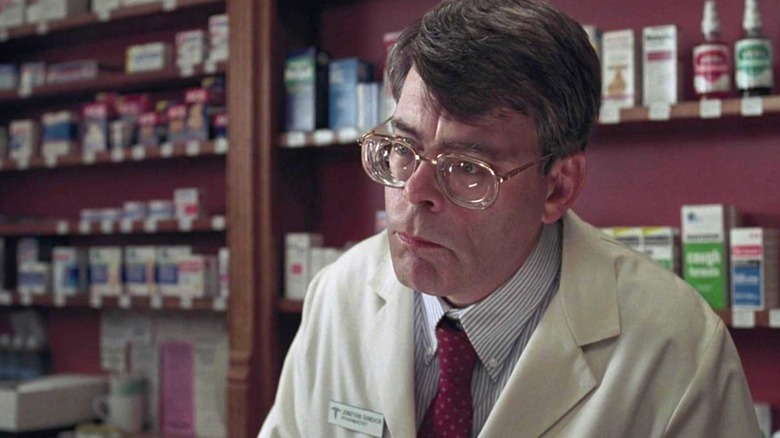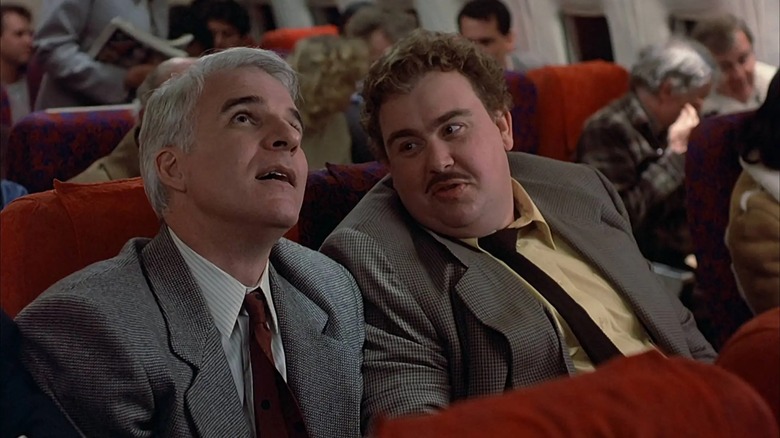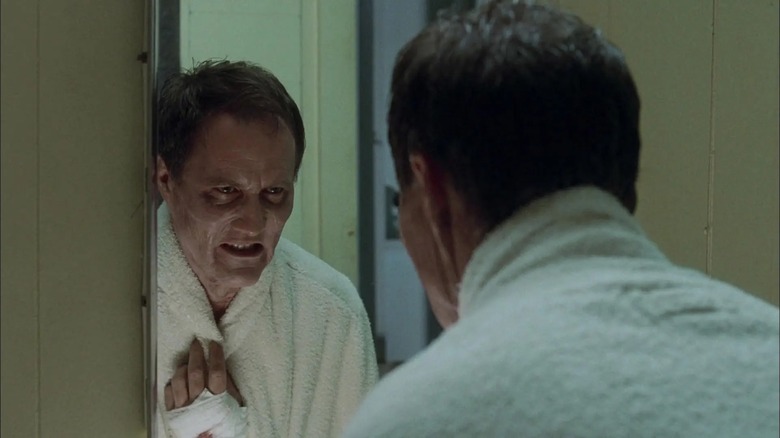Stephen King Originally Wanted A Comedy Legend To Star In Thinner
In the 1990s, Hollywood found both success and failure by digging deep into the back catalog of horror master Stephen King. The decade saw some of the best adaptations of his work ("Misery," "The Shawshank Redemption," "The Green Mile") and some of the worst (we don't need to talk about "The Lawnmower Man"), but its high and low points alike notably drew from lesser-known King works, as many of his major hits were already adapted in the decades prior. "Thinner" falls into this category: Released in 1984, the novel that inspired the movie was well-regarded upon release, but is mostly known now as the book that helped readers identify King as the writer behind pseudonym Richard Bachman.
Plenty of King fans love "Thinner," but the novel about an overweight man who is cursed to lose weight rapidly to the point of emaciation isn't exactly as high profile as the novelist's more zeitgeist-defining works. The Tom Holland-directed film adaptation released in 1996 didn't help matters, as it earned bad reviews and meager box office returns. Yet if King had his way, the big screen version of "Thinner" could've been a lot more memorable thanks to the presence of a beloved comedic icon: According to producer Mitchell Galin (via CinemaBlend), King originally wanted John Candy to play the lead role.
Thinner's producers reached out to comedian John Candy
In the '80s, ultra-funny Canadian Candy was one of the biggest names in comedy thanks to his iconic turns in movies like "Planes, Trains and Automobiles," "Uncle Buck," "Spaceballs," and "Stripes." A frequent collaborator with decade-defining filmmaker John Hughes, Candy's screen presence was boisterous, versatile, and either lovable or irritating, depending on what part he'd been asked to play. He gained fame for his talent and apparent real-life kindness, but he was also known for his size, which often matched the larger-than-life personalities he played on camera. During the final years of his life, Candy appeared in movies including "Cool Runnings" and "Canadian Bacon," and had signed on to a role in Disney's "Pocahontas" that was later cut, according to Vulture. He'd also been contacted by the team behind "Thinner."
"We did reach out to [John] Candy's people," Galin explains on the Scream Factory Blu-ray commentary track for the film. The producer noted that Candy did not take the role, though it seems he couldn't remember why. "For whatever reason — Candy was either busy, or he didn't spark to [the material] ... I really have no idea," he shared. "At some point, you put it out there, if it doesn't get the response you want, at the end of the day, I really don't care." Galin noted that the circumstances would've been different if the film had needed Candy's name attached to it to continue into production, but it didn't (likely King's own pop cultural cachet was enough to get "Thinner" made), so they moved on. Robert John Burke eventually landed the part of overweight lawyer and cursed protagonist Billy Halleck — and he wore a fat suit for the role.
Stephen King reportedly thought the role would save Candy's life
Originally, though, King proposed the idea of an actual fat actor playing the character, apparently under the misguided notion that if he lost weight for the role, it would help Candy avoid an untimely death. "Steve's comment was like, 'We'll pay him a nice chunk of money, and we'll save his life,'" Galin recalled. Setting aside the fact that random strangers spend far too much time thinking about how to "save" fat people from themselves, King's alleged comment is just off base. Candy would go on to die at the age of 43 from a heart attack, but it was likely due to a combination of factors that included genetics (his father died of heart disease at age 35), cocaine use, smoking, and disordered eating, per the documentary "Autopsy: The Last Hours of John Candy." He also dieted throughout adulthood, trying the restrictive Pritikin diet several times, according to biographer Martin Knelman.
It's frustrating to hear such everyday fatphobia (a depressing norm in King's works) dressed up as a job offer, especially when Candy himself admitted he didn't enjoy comments on his weight. "Sure, I'm sensitive about my weight," he's quoted as saying in the book "Wild and Crazy Guys," written by Nick de Semlyen. "I don't do fat jokes." In the same anecdote, he called a critic who described him as an "elephant" in one movie review a "jerk" who "can't even be clever." For his part, King got the idea for "Thinner" after his own doctor told him to lose weight and quit smoking, leading him to examine his fraught relationship to his own body. "Once the weight actually started to come off, I began to realize that I was attached to it somehow, that I didn't really want to lose it," he told The Washington Post in 1985. "I began to think about what would happen if somebody started to lose weight and couldn't stop."
In the end, the movie version of "Thinner" turned out to be a footnote in King's filmic legacy, while Candy's films remain comedy touchstones for generation after generation. Whatever the reason, I'm glad the actor didn't take the lead role in "Thinner": He deserved better.


